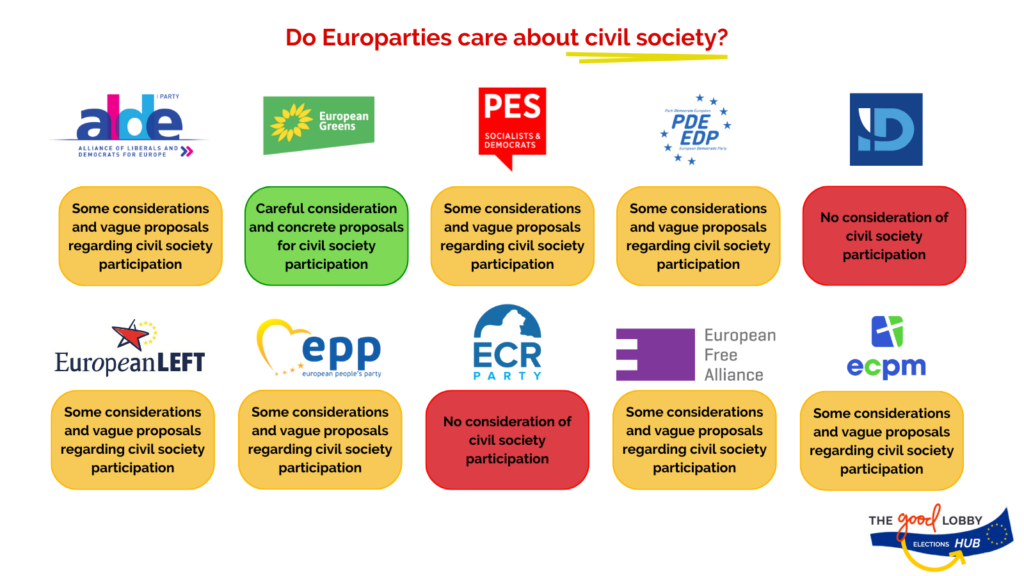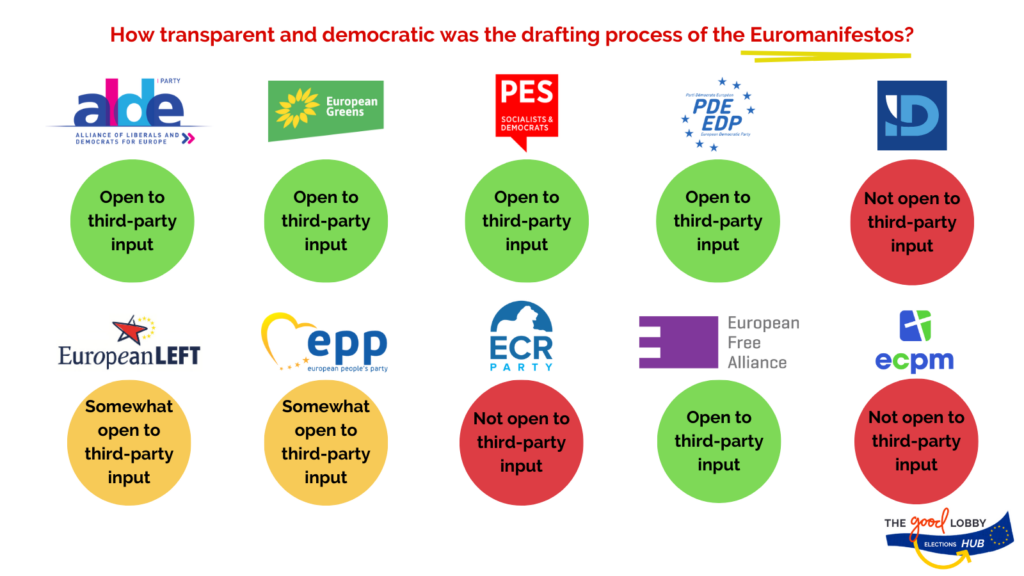As the European Union gears up for a new political cycle, the role of civil society within its decision-making processes hangs in the balance. With manifestos serving as a roadmap for Europarties’ priorities, our analysis reveals a concerning trend: the prospect of further shrinking space for civil society.
In dissecting the manifestos of the main Europarties, a worrying trend is apparent in their treatment of civil society involvement. The European People’s Party manifesto falls short of proposing concrete initiatives to bolster its role in EU affairs. Similarly, the Party of European Socialists fails to outline specific measures for enhancing civil society participation.
The Party of the European Left also disappoints, with minimal references to civil society engagement in EU decision-making. The European Democratic Party and the European Free Alliance Party follow suit, neglecting to address civil society’s crucial role altogether – neither party mentions civil society even once in their manifestos.
There is however a notable exception. The European Greens’ manifesto includes 19 direct references to civil society, standing out as champions of grassroots engagement. Their manifesto not only acknowledges the encroaching limitations on civil society organisations but also advocates for concrete actions to reverse this trend. The European Greens’ call for increased funding for nonprofits underscores a recognition of the financial constraints hindering civil society’s effectiveness. Incidentally, the Greens were one of the two Europarties whose manifesto-drafting process was most transparent – as the party set up an online consultation available to everyone.
A commitment to improving the involvement of civil society organisations in EU decision-making should not be a partisan question. In fact, the EU is treaty-bound to improve engagement with civil society. Article 11 of the Treaty on the European Union highlights the importance of citizen participation in EU policy-making and establishes that the EU should remain in “open, transparent and regular dialogue with representative associations and civil society.” The Good Lobby frequently underscores the glaring power asymmetry between civil society organisations and corporate entities in shaping EU policies and decisions.
The last main Europarty set to unveil their manifesto is ALDE – the party of European liberals. ALDE was the other party that, like the Greens, set up an online public consultation open to all. ALDE will publish their manifesto during a party congress on 20-21 March. It remains to be seen whether civil society will factor into their priorities for the 2024-2029 cycle. The bar is exceedingly low. Will ALDE’s manifesto also ignore the importance of civil society participation in EU decision-making?

Civil society ranking methodology:
Article 11(2) of the Treaty on the European Union mandates that the EU institutions “shall maintain an open, transparent and regular dialogue with representative associations and civil society.” In addition, the European Parliament is supposed to represent the EU’s citizenry. In this capacity, it is incumbent on European political parties to strive to improve the general public’s access to EU policy making, by in particular, proposing concrete policies and initiatives in their manifestos concerning how to better incorporate the voice of citizens in the EU’s day-to-day functioning.
The Good Lobby has evaluated each Europarties’ manifesto from the civil society standpoint. In other words, to what extent does each Europarty recognise the importance of civil society participation in EU decision-making processes and whether the manifesto outlines specific proposals or initiatives it plans to implement to this end.
We have ranked all Europarties according to a traffic-light system, where green indicates careful consideration and concrete proposals relating to civil society participation; orange indicates some consideration and vague proposals; and red indicates no consideration for civil society’s role in the EU.
Learn more about The Good Lobby’s work on the EU Elections
Visit the dedicated page by clicking on the button on the right
